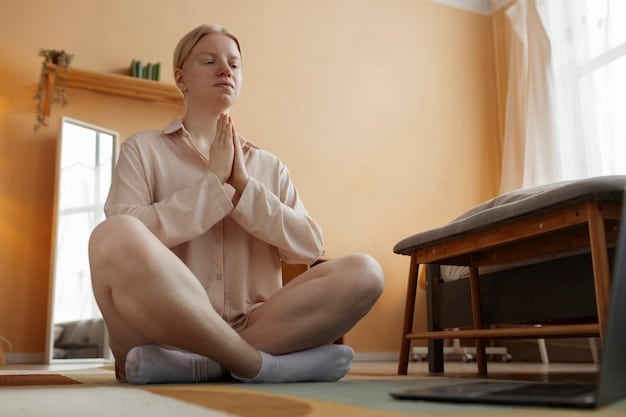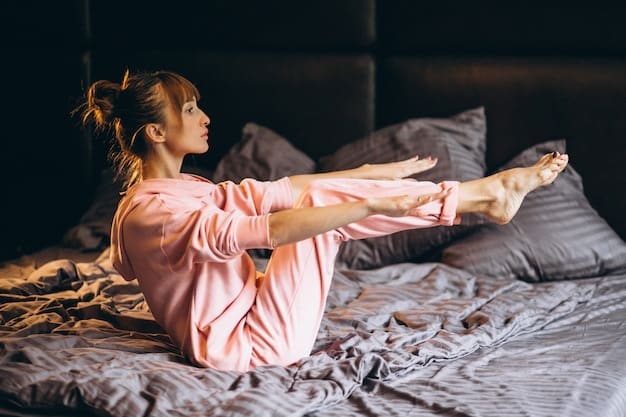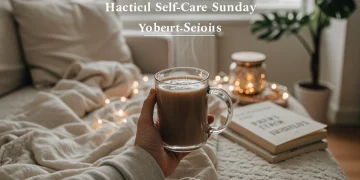Unlock Better Sleep: Your Restorative Self-Care Sunday Routine

Advertisements
Unlock Better Sleep: Your Guide to a Restorative Self-Care Sunday Routine offers a comprehensive roadmap to transform your Sundays into a haven of relaxation, promoting better sleep through intentional self-care practices and creating a foundation for restful nights.
Are you struggling to get a good night’s sleep? Your Sunday routine might be the key to unlocking better rest. Dive into how a dedicated self-care Sunday can revolutionize your sleep quality, setting you up for a week of energized days and peaceful nights. Let’s explore how to Unlock Better Sleep: Your Guide to a Restorative Self-Care Sunday Routine.
Advertisements
Transform Your Sundays for Restful Nights
The connection between your Sunday activities and your sleep quality is more profound than you might realize. Instead of dreading the impending work week, use Sundays as an opportunity to recharge and prepare your mind and body for restful sleep. By establishing a consistent and soothing Sunday routine, you can significantly improve your sleep hygiene and overall well-being.
So, how exactly can you transform your Sundays into a sleep-enhancing ritual? The answer lies in incorporating self-care practices that reduce stress, promote relaxation, and align your body clock.
The Power of a Consistent Sleep Schedule
One of the most critical elements of sleep hygiene is maintaining a consistent sleep schedule. This means going to bed and waking up at the same time every day, even on weekends. This consistency helps regulate your body’s natural sleep-wake cycle, also known as your circadian rhythm.
Creating a Relaxing Bedtime Environment
Your sleep environment plays a significant role in the quality of your sleep. A dark, quiet, and cool bedroom is ideal for promoting restful sleep. Consider using blackout curtains, earplugs, or a white noise machine to minimize distractions. Also, ensure your mattress and pillows are comfortable and supportive.
Incorporating these elements into your Sunday routine can create a powerful foundation for better sleep throughout the week.
- Set a Consistent Wake-Up Time: Even on Sundays, try to wake up around the same time you do during the week to regulate your body clock.
- Avoid Napping Excessively: While a short nap can be refreshing, long or frequent naps on Sundays can disrupt your sleep cycle.
- Limit Screen Time Before Bed: The blue light emitted from electronic devices can interfere with melatonin production, making it harder to fall asleep.
By understanding the impact of your Sunday habits, you can take proactive steps to improve your sleep. Make conscious choices that support relaxation and prepare your body for a night of deep, restorative rest. It all starts with a mindful approach to your Sunday activities.
Mindfulness and Meditation for Sleep
Incorporating mindfulness and meditation into your Sunday routine can significantly reduce stress and promote relaxation, leading to better sleep. These practices help calm the mind, reduce anxiety, and create a sense of inner peace. Start by dedicating even just a few minutes to these activities to experience noticeable improvements.
Mindfulness meditation involves focusing your attention on the present moment without judgment, while other forms of meditation can involve guided visualizations or focused breathing exercises. Both can be powerful tools for improving sleep quality.

Simple Mindfulness Exercises for Beginners
If you’re new to mindfulness, starting with simple exercises can make the practice more accessible. One easy technique is focusing on your breath. Sit comfortably, close your eyes, and pay attention to the sensation of each inhale and exhale. When your mind wanders, gently redirect your attention back to your breath.
Guided Meditation for Sleep
Guided meditations are a wonderful way to deepen your relaxation and prepare for sleep. Many apps and online resources offer guided meditations specifically designed to help you unwind and fall asleep. These meditations often involve soothing narratives and visualizations that promote relaxation.
By integrating these practices into your Sunday self-care routine, you can cultivate a greater sense of calm and improve your sleep quality.
- Set Aside Dedicated Time: Schedule 10-15 minutes each Sunday for mindfulness or meditation.
- Create a Quiet Space: Find a peaceful environment where you can practice without distractions.
- Use a Meditation App: Apps like Headspace or Calm offer guided meditations for sleep and relaxation.
Mindfulness and meditation offer a pathway to inner peace and improved sleep. By incorporating these practices into your Sunday routine, you can create a foundation for restful nights and energized days.
Creating a Relaxing Evening Ritual
Establishing a consistent evening ritual on Sundays can signal to your body that it’s time to wind down and prepare for sleep. This ritual should consist of activities that promote relaxation and reduce stimulation. Consistency is key to training your body to recognize the cues that precede sleep.
Think of your evening ritual as a bridge between your active day and restful night. It’s a time to disconnect from technology, release tension, and engage in activities that soothe your mind and body.
The Importance of a Digital Detox
One of the most important aspects of a relaxing evening ritual is a digital detox. Avoid using electronic devices at least an hour before bed. The blue light emitted from screens can suppress melatonin production, making it harder to fall asleep. Replace screen time with activities like reading a book or listening to calming music.
Gentle Stretching and Yoga
Gentle stretching or restorative yoga can help release tension in your muscles and promote relaxation. Focus on poses that lengthen and relax the spine, such as child’s pose, forward folds, and gentle twists. These practices can ease physical discomfort and prepare your body for sleep.

By incorporating these practices into your Sunday evening routine, you can create a powerful signal that it’s time to wind down and prepare for a restful night.
- Take a Warm Bath: Add Epsom salts or essential oils like lavender to enhance relaxation.
- Read a Book: Choose a relaxing book that isn’t too stimulating.
- Listen to Calming Music: Opt for instrumental music or nature sounds.
A well-crafted evening ritual can be a game-changer for your sleep. By creating a consistent routine that promotes relaxation, you can train your body to recognize the cues that precede sleep and enjoy a night of deep, restorative rest.
Nutrition and Sleep: Sunday Meal Planning
What you eat and drink on Sundays can significantly impact your sleep quality. Making conscious choices about your meals and beverages can help regulate your body clock, reduce inflammation, and promote relaxation. Consider Sunday as an opportunity to plan your meals strategically.
Certain foods and drinks can interfere with sleep, while others can promote relaxation and improve sleep quality. Understanding the connection between nutrition and sleep is essential for creating a restorative Sunday routine.
Foods to Avoid Before Bed
Avoid heavy, fatty foods, sugary snacks, and caffeine-containing beverages in the hours leading up to bedtime. These can disrupt your sleep, causing indigestion, heartburn, and restlessness. Also, limit alcohol consumption, as it can interfere with your sleep cycle and lead to fragmented sleep.
Sleep-Promoting Foods and Drinks
Include sleep-promoting foods and drinks in your Sunday meals and snacks. Foods rich in tryptophan, such as turkey, nuts, and seeds, can help promote relaxation. Chamomile tea is a caffeine-free beverage known for its calming properties. Also, consider incorporating magnesium-rich foods like leafy greens and avocados into your diet.
By making mindful choices about your Sunday meals and beverages, you can support your body’s natural sleep-wake cycle and enjoy a night of restful sleep.
- Plan Your Meals: Create a meal plan that includes sleep-promoting foods and avoids sleep disruptors.
- Hydrate Wisely: Drink plenty of water throughout the day, but limit fluids before bedtime to avoid frequent trips to the bathroom.
- Consider Herbal Teas: Chamomile, lavender, and valerian root teas can promote relaxation.
Nutrition plays a vital role in sleep quality. By making informed choices about your Sunday meal planning, you can nourish your body and prepare it for a night of deep, restorative rest.
Optimizing Your Sleep Environment on Sundays
Your sleep environment is a critical factor in determining the quality of your sleep. Creating a comfortable, relaxing, and conducive sleep space can significantly improve your ability to fall asleep and stay asleep. Take time on Sundays to optimize your bedroom for sleep.
A well-designed sleep environment minimizes distractions, promotes relaxation, and aligns with your body’s natural sleep-wake cycle. This involves addressing factors like temperature, noise, light, and comfort.
Temperature and Ventilation
Keep your bedroom cool and well-ventilated. The ideal temperature for sleep is between 60 and 67 degrees Fahrenheit. This cooler temperature signals to your body that it’s time to sleep. Use a fan or open a window to improve ventilation and maintain a comfortable temperature.
Noise and Light Control
Minimize noise and light distractions. Use blackout curtains to block out external light sources. If noise is a problem, consider using earplugs or a white noise machine to mask disruptive sounds. A quiet and dark environment promotes melatonin production and supports restful sleep.
By optimizing your sleep environment on Sundays, you can create a haven for restful sleep that supports your overall well-being.
- Invest in Comfortable Bedding: Choose a supportive mattress, comfortable pillows, and breathable sheets.
- Declutter Your Bedroom: A clutter-free space promotes relaxation and reduces stress.
- Use Aromatherapy: Diffuse calming essential oils like lavender or chamomile.
Your sleep environment is a sanctuary for rest and rejuvenation. By optimizing it on Sundays, you can create a space that supports deep, restorative sleep and enhances your overall well-being.
Sunday Self-Care for Mental Wellbeing and Sleep
Mental wellbeing directly impacts sleep quality. Stress, anxiety, and emotional turmoil can disrupt your sleep cycle and lead to insomnia. Prioritizing self-care on Sundays can help manage these emotional factors and promote better sleep.
Self-care involves engaging in activities that nurture your mental, emotional, and physical health. This can include anything from spending time in nature to practicing gratitude or pursuing a hobby you enjoy.
The Benefits of Spending Time in Nature
Spending time in nature has been shown to reduce stress, lower blood pressure, and improve mood. Take a walk in a park, hike in the woods, or simply sit outside and enjoy the fresh air and sunshine. Nature provides a natural antidote to stress and promotes relaxation.
Practicing Gratitude and Positive Affirmations
Practicing gratitude and positive affirmations can help shift your focus from negative thoughts to positive ones. Keep a gratitude journal and write down things you’re thankful for. Use positive affirmations to reinforce your self-esteem and promote a sense of well-being. These practices can help reduce anxiety and improve sleep.
- Engage in Hobbies: Pursue activities you enjoy, such as painting, gardening, or playing music.
- Connect with Loved Ones: Spend quality time with family and friends.
- Practice Self-Compassion: Treat yourself with kindness and understanding.
Self-care is not a luxury; it’s a necessity for mental and emotional wellbeing. By prioritizing self-care on Sundays, you can manage stress, enhance your mood, and promote better sleep.
| Key Point | Brief Description |
|---|---|
| ⏰ Consistent Sleep Schedule | Regulate your body clock by waking up around the same time every day. |
| 🧘 Mindfulness Meditation | Calm your mind and reduce stress with simple mindfulness exercises or guided meditations. |
| 📵 Digital Detox | Avoid screens at least an hour before bed to improve melatonin production. |
| 🍃 Sleep-Promoting Foods | Plan Sunday meals with tryptophan-rich foods and avoid heavy, sugary items. |
Frequently Asked Questions (FAQs)
▼
A Sunday routine sets the tone for the week. By incorporating self-care and relaxation, you reduce stress and prepare your body for restful nights ahead.
▼
Even 10-15 minutes of mindfulness can make a difference. Consistency is key, so aim to practice regularly on Sundays to see noticeable improvements.
▼
Avoid heavy, fatty foods, sugary snacks, and caffeine-containing beverages in the hours leading up to bedtime. These can disrupt your sleep.
▼
Keep your bedroom cool, dark, and quiet. Use blackout curtains, earplugs, and a fan to create a conducive sleep environment.
▼
Take a walk in nature, practice gratitude, engage in a hobby you enjoy, or spend quality time with loved ones. These activities promote relaxation.
Conclusion
Transforming your Sundays into a dedicated self-care routine can be a game-changer for your sleep quality and overall wellbeing. By incorporating consistent sleep schedules, mindfulness practices, relaxing evening rituals, mindful nutrition, optimizing your sleep environment, and prioritizing mental wellbeing, you create a foundation for restful nights and energized days.





